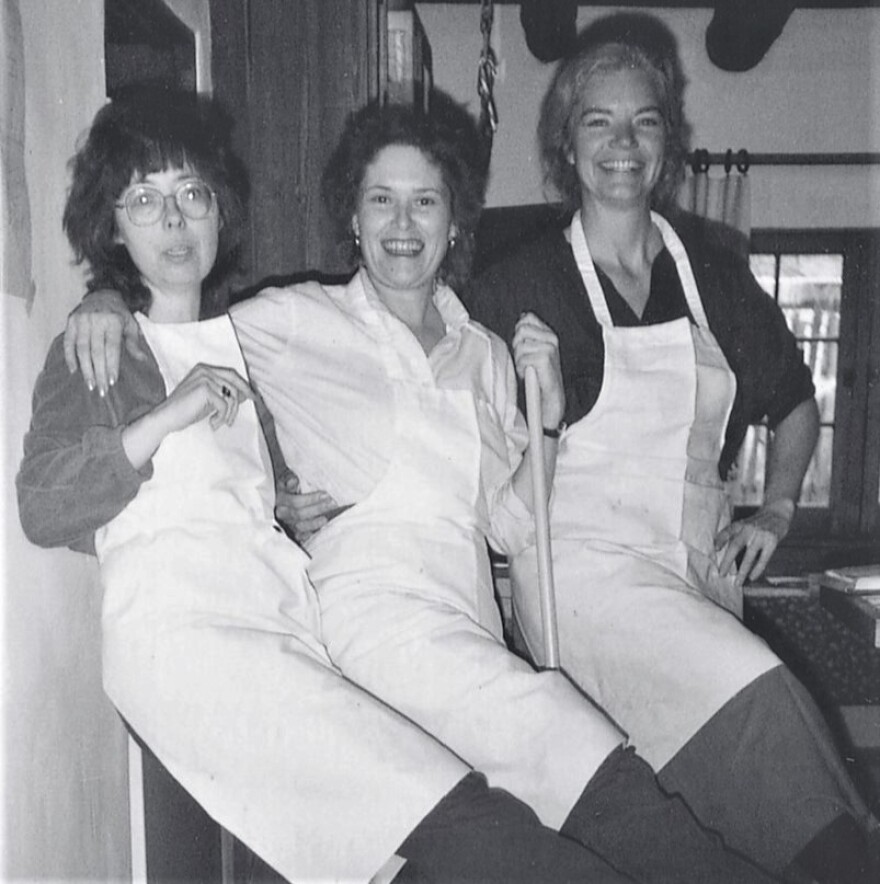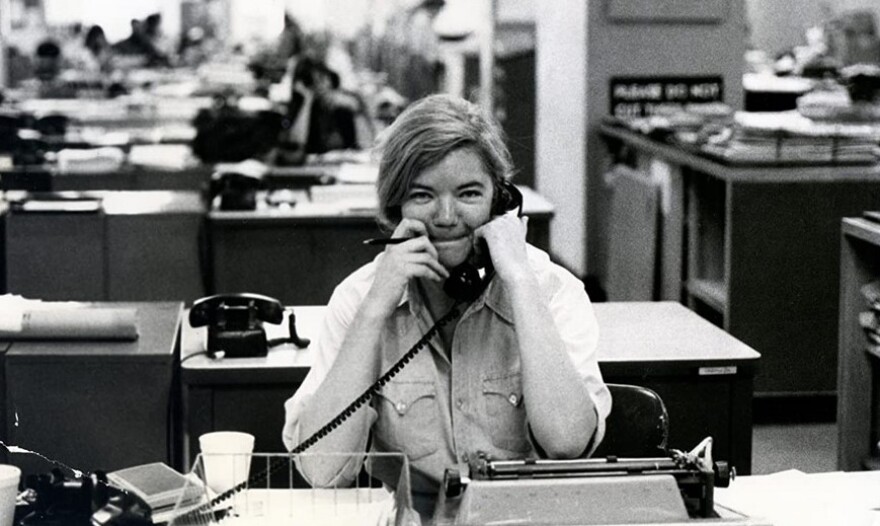Before Jon Stewart and John Oliver or even Gail Collins in The New York Times, there was Molly Ivins. She was the trailblazing Texas journalist known for her cheerful, biting, political wit. Raise Hell: The Life and Times of Molly Ivins, a documentary about her, airs Monday March 28 on KERA-TV, Channel 13.
Molly Ivins wrote seven books, two of them bestsellers. At her peak in the 1990s and early 2000s, her column was syndicated in 400 newspapers across the country. And that doesn't include the countless hours she appeared on TV and radio as a guest pundit from Texas.
But filmmaker Janice Engel really didn't know who she was: "I mean, I'd heard of her, but by the time she was a columnist, I was in L.A. and she wasn't in our papers."
Then, in 2014, Kathleen Turner was portraying Ivins in a one-woman stage show. A friend of Engel's told her she had to see Red Hot Patriot: The Kick-Ass Wit of Molly Ivins — written by Margaret and Allison Engel (no relation to Janice).
That's how Janice Engel encountered "this six foot tall, red haired Texan who spoke truth to power and whether you are on the left or the right, it didn't matter. She went after stupidity and she was fearless, and man, she was funny."

That was the Ivins who'd amused or enraged her fellow Texans for decades with comments like this:
"Texas has always been the National Laboratory for bad government. I mean, if you want to see a bad idea tried, we've tried it."
Or her cheerful opening for a Dallas Times Herald column: "Happy May Day, comrades."
Engel had produced TV documentaries and series. This time, she co-wrote and directed Raise Hell.
Nowadays, with so much political satire streaming on cable and online, Engel said she's often asked, who's the new Molly Ivins?
Samantha Bee? Stephen Colbert?
No one, really. Engel noted all the TV hosts came up as comedians, not reporters covering the state house.
"They're really brilliant," she said, "but they have staffs. Molly was a serious journalist. And she was on her own."
Mary Ann Roser and Ivins both covered state politics in the '90s for the Fort Worth Star-Telegram. Ivins wrote three columns a week — plus assignments for The Nation, Mother Jones and McCall's , while also appearing on 60 Minutes and NPR. In the Star-Telegram's Austin bureau, she worked alone in a specially ventilated office.
That wasn't simply because, by then, she was the paper's star columnist.
"She smoked like a fiend," said Roser. "And she would come in for about maybe an hour and a half and just bat out a column. I mean, it was amazing to watch her because she was so fast and so smart."

Kaye Northcott was Ivins' friend and editor at the Texas Observer. After a short stint covering the police in Minneapolis, Ivins truly got her start as a political journalist in 1971 at the Observer, the venerable, liberal, bimonthly paper in Austin.
Northcott says Ivins' public image -- the good ol' gal cracking wise and taking on the good ol' boys -- was partly a persona she created over time.
"It was like she was onstage all the time," Northcott said.Ivins was actually from a wealthy, conservative Houston family - with a strict father, a Tenneco exec nicknamed the "General." She graduated from the elite Smith College in Massachusetts (where she learned to drop her Texas accent) and earned her master's degree at Columbia University's School of Journalism.
But Northcott said, Ivins' casual, flamboyant Texas character wasn't entirely an act. Not at all. She came to her job interview at the Observer -- "and she brought a case of beer," Northcott said with a laugh.
Friends of Ivins have described her actually as shy. As a sharp-tongued, six-foot-tall, big-boned woman, she had never truly fit in with the upper-class decorum of Houston society or Smith College traditions.
Ivins gained national attention with her free-spirited coverage of the Texas legislature for the Observer. Her knowledge of political foolishness, placidity and corruption, her wit and her down-home style stood out among the punditry. In the early '70s, there was little real political humor in print. It certainly didn't exist on TV. Mostly, there were editorial cartoons — and the occasional stand-up along the lines of Mort Sahl or Richard Pryor.
In Austin at that time, "we just had so much fun," Northcott said. "You know, when you've got a writer like that, just let her do her thing."

Trouble came when Ivins was hired by The New York Times. She was supposedly headed to newsprint stardom, but it was a classic case of management wanting to be smart and funny -- until it got both. The editors enjoyed Ivins' best lines -- then cut them. She was criticized for her lack of formality, her dress. She was one of the few female writers there.
"She was wandering around New York like Oscar Wilde, amusing people in cocktail party after cocktail party," Northcott said. "But her life was miserable at the Times."
In 1977, she was more or less banished to be the Times' Rocky Mountain bureau chief. She had to cover nine states by car. So in 1981, when the Dallas Times Herald said Ivins could write about anything she wanted, she happily drove back to Texas.
Within a few years, naturally, the Herald was posting billboards around town asking, "Molly Ivins Can't Say That, Can She?" — a line from one of the many angry letters the Herald had received from readers. It became the title of her first, best-selling collection of columns.
Ivins is remembered as a staunch feminist, an outspoken liberal who's frequently quoted for such lines as her description of Patrick Buchanan's "culture war" speech at the Republican National Convention in Houston in 1992: "It probably sounded better in the original German."
But Ivins could also be very cutting with many progressive politicians she found vacillating or too accommodating with basic, human principles. When it came to President Bill Clinton's "welfare reform" bill that reportedly cut one million children from government assistance, Ivins called him as "weak as bus station chili."
Ivins used humor to mock; this was political satire, a scourge of the powerful. But she also used it to cheer up her readers. In the rough and tumble of politics and punditry, she was a happy warrior. She didn't want readers to lose hope.
Director Engel said, Ivins also used humor to disarm people: "Molly knew that humor was the door key to the brain. Because that's what humor does. Humor makes us laugh, we feel really good and we can listen."

But Ivins' incessant smoking and the alcoholism she struggled to control eventually caught up with her. After a seven-year battle with breast cancer, she died in 2007. She was 62.
Political satire often doesn't age well. It loses the electric anger or the immediate amusement that powered it. It becomes historical.
But Ivins' smiling humor in the face of yet another political outrage can still feel fresh. In our divided democracy, she had a fundamental faith in engaged American citizens holding the real power -- not our leaders.
"We are the board of directors," she said. "We own it. They're just the people we have hired to drive the bus for a while."
Raise Hell: The Life and Times of Molly Ivins airs Monday, March 28, at 9 p.m. on KERA-TV, Channel 13.
Got a tip? Email Jerome Weeks at jweeks@kera.org. You can follow him on Twitter @dazeandweex.
Art&Seek is made possible through the generosity of our members. If you find this reporting valuable, consider making a tax-deductible gift today. Thank you.



